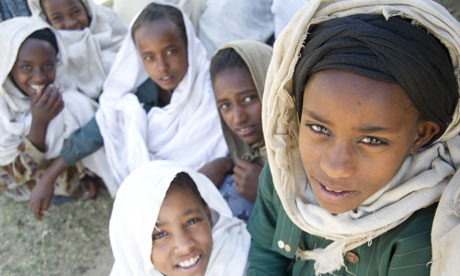 |
| The ICRW is evaluating research into the economic and health needs of adolescent girls in Ethiopia. Photograph: David Snyder/ICRW |
Over the past decade, evaluation has become an essential part of most development programmes. This reflects the growing emphasis on designing cost-effective projects that demonstrate significant change. This shift has coincided with a greater awareness of the need to focus more explicitly on gender as a key factor in development-related issues.
Overall, these developments are welcomed; as practitioners we should all aim to use evidence of what works and, crucially, what doesn't work to improve our programmes. Doing so also results in better outcomes for beneficiaries.
However, the evaluation community has been slow to appreciate the fundamental role that gender may play in shaping the results of their programme evaluations. In particular, they do not pay enough attention to understanding how gender inequities may shape participation and response to specific interventions, or how gender relations may influence even the basic processes of data collection. Too often we still see evaluators assuming that simply categorising their data by gender constitutes "gendered analysis".
As an applied research institute focused on women and girls, the International Center for Research on Women (ICRW), where I work, develops and promotes a more intuitive approach to gender in programme monitoring and evaluation. This starts with an understanding that data collection and analysis are not gender-neutral processes, but rather are – at least, in part – reflective of broader societal and cultural norms and expectations about male and female behaviour.
As a result, truly effective monitoring and evaluation must begin by making women's and men's concerns and experiences integral to the design and implementation of both programmes and their evaluations. Doing so requires taking care from the outset to ensure that monitoring and evaluation systems fully account for how men and women may respond to programme interventions in different ways. It also means being thoughtful about how gender relations more broadly may influence the effectiveness of the programme, data collection and analysis. Simply collecting data from men and women is necessary but certainly not sufficient.
One example of how gender-responsive monitoring and evaluation can be implemented is a project the institute is conducting with Care-Ethiopia and local NGO partners. The project works to address the economic and health needs of more than 5,000 adolescent married girls in the Amhara region of Ethiopia through a group-based, peer-education approach. In collaboration with partner organisations, ICRW led the development of the evaluation used in the project and a customised monitoring and information system.
All organisations took great care to think about how programme and evaluation decisions would have an impact on adolescent girls specifically. For example, while the group-based approach is effective with adult men and women in this context, the restricted mobility and time constraints young married girls face made this approach more challenging. We addressed this in a number of ways, including attentively constructing the groups to include girls living close to each other, engaging the community to encourage family support for girls' participation, and emphasising flexibility in terms of scheduling meetings and other activities.
Our team designed a monitoring system both to collect information on the process of the project and to generate usable and timely information for the programme team. For instance, in addition to quantifiable information, monitoring forms also collected qualitative assessments of activities, such as staff opinions of the atmosphere at meetings, assessments of reasons for girls' absences and input from girls about their experiences at gatherings.
To collect evaluation data, we applied a multi-method approach focused on how gender inequalities shape economic and health behaviours. In particular, data was gathered on decision-making from couples and households and other factors such as couple communication and experience with intimate partner violence. Qualitative data was also collected from girls and key individuals in their lives, allowing for the voices of participants to play a direct role in improving our understanding of the project's impact.
In the case of our evaluation of the Care-Ethiopia project, the explicit focus on developing a gender-responsive approach from the early stages of programme and evaluation design has resulted in a much richer understanding of the determinants of economic independence and health. This data has already proven to be extremely useful to programme staff, highlighting misconceptions of the lives of adolescent girls and providing clear evidence for adapting the programme model "on the fly". Furthermore, the early focus on gender ensured that we focused on the right set of indicators and questions to understand the social processes shaping behaviour better.
We believe that this approach can and should be broadly implemented as a part of evaluation science, because in the end this will give development practitioners a much better idea of what works, what doesn't and, perhaps most importantly, why.
Jeffrey Edmeades is a social demographer at the International Center for Research on Women.
http://www.guardian.co.uk

No comments:
Post a Comment